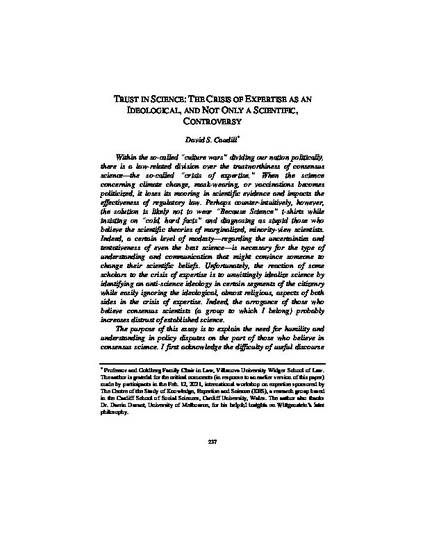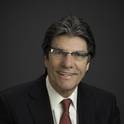
Article
TRUST IN SCIENCE, CRISIS OF EXPERTISE AS IDEOLOGICAL, AND NOT ONLY SCIENTIFIC, CONTROVERSY Caudill.pdf
Quinnipiac Law Review
(2021)
Abstract
Within the so-called “culture wars” dividing our nation politically, there is a law-related division over the trustworthiness of consensus science—the so-called “crisis of expertise.” When the science concerning climate change, mask-wearing, or vaccinations becomes politicized, it loses its mooring in scientific evidence and impacts the effectiveness of regulatory law. Perhaps counter-intuitively, however, the solution is likely not to wear “Because Science” t-shirts while insisting on “cold, hard facts” and diagnosing as stupid those who believe the scientific theories of marginalized, minority-view scientists. Indeed, a certain level of modesty—regarding the uncertainties and tentativeness of even the best science—is necessary for the type of understanding and communication that might convince someone to change their scientific beliefs. Unfortunately, the reaction of some scholars to the crisis of expertise is to unwittingly idealize science by identifying an anti-science ideology in certain segments of the citizenry while easily ignoring the ideological, almost religious, aspects of both sides in the crisis of expertise. Indeed, the arrogance of those who believe consensus scientists (a group to which I belong) probably increases distrust of established science.
The purpose of this essay is to explain the need for humility and understanding in policy disputes on the part of those who believe in consensus science. I first acknowledge the difficulty of useful discourse between groups who seem to live in different realities, and I draw on the recent work of sociologists who recommend modesty concerning probabilistic scientific models and data that can rarely be characterized as unchanging “cold, hard facts.” I then propose that each side in the crisis of expertise be understood as quasi-religious believers in their facts, not in the sense of deistic belief, but rather as occupying a worldview. Finally, drawing upon Wittgenstein and those sociologists of science inspired by his later philosophy, I identify four types of experts in the crisis of expertise—consensus scientists, those who believe in consensus science, marginalized scientists, and those who hold marginalized scientific views. Expertise, that is, should not be associated with esoteric knowledge (or even correctness) but is rather the result of a community with shared practices and a common language. I conclude that we need to both (i) reconceive science as a field of numerous uncertainties, and (ii) recognize that each side in the crisis of expertise reflects faith-like commitments. Those two moves will best serve the goal of communication with respect to scientific disputes, whether generally in the culture wars or specifically in governmental policy contexts.
Keywords
- science,
- scientific beliefs,
- culture wars,
- consensus science,
- scientific expertise,
- Ludwig Wittgenstein
Disciplines
Publication Date
2021
Citation Information
David S Caudill. "TRUST IN SCIENCE, CRISIS OF EXPERTISE AS IDEOLOGICAL, AND NOT ONLY SCIENTIFIC, CONTROVERSY Caudill.pdf" Quinnipiac Law Review Vol. 40 (2021) p. 237 - 287 Available at: http://works.bepress.com/david_caudill/135/
